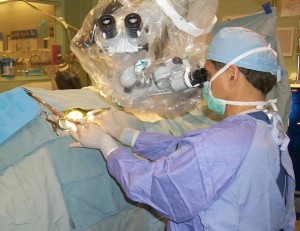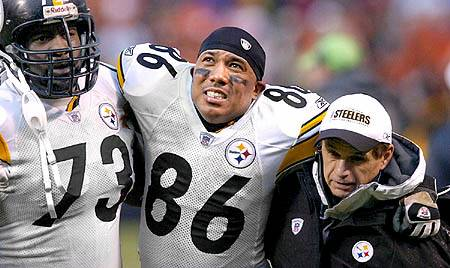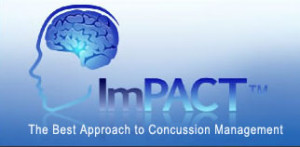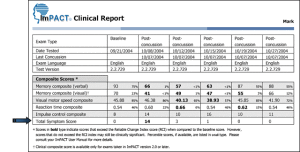What is ImPACT™?
ImPACT™ (Immediate Post-Concussion Assessment and Cognitive Testing) is a computer-based, easy to administer neuropsychological test battery. With ImPACT™, you can objectively assess brain functions that are typically affected if someone has a concussion. By administering ImPACT™ to athletes before they have a concussion (baseline), and subsequently when a concussion is suspected, individualized before-and-after comparison is possible. Dr. Maroon co-developed ImPACT™ along with Mark Lovell, PhD. ImPACT™ is recognized as the world leader in concussion testing.
The development of ImPACT™
It was a specific event that led to the development of ImPACT™: While working with the Steelers in the early 1990’s, Dr. Maroon had told Steelers legendary coach Chuck Noll that his starting quarterback couldn’t play the following week due to a recent concussion. Coach Noll protested and asked Dr. Maroon “why”, since the quarterback appeared to be healthy to him.
At the time, the “state-of-the-art” concussion protocol was based on general guidelines which stipulated that following a concussion, a player had to stay out of play for two weeks. Coach Noll questioned Dr. Maroon to as to who wrote the guidelines and whether they had sufficient scientific basis. At this point, Dr. Maroon became painfully aware that these guidelines were formulated as a general recommendation, but that they did not pertain to every athlete and every circumstance.
For the team, the consequences of sidelining a starting quarterback, or any player for that matter, can be severe. However, for the athlete, so can be playing football with a concussion. To responsibly balance both interests, individual testing would be required on a case-by-case basis to determine whether the brain of a specific athlete had recovered sufficiently to “safely” risk further impact during a game. The lack of an objective, reliable instrument to individually evaluate concussion symptoms became very apparent to Dr. Maroon. To address this void, Dr. Maroon contacted a neuropsychologist, Dr. Mark Lovell and together, they developed ImPACT™.
Why is testing for concussions so important?
In the United States, the annual incidence of sports-related concussion is estimated at 300,000. Estimates regarding the likelihood of an athlete in a contact sport experiencing a concussion may be as high as 19% per season and the risk increases steadily after previous concussion(s). Although the majority of athletes who experience a concussion are likely to recover, an as of yet unknown number of these individuals may experience chronic cognitive and neurobehavioral difficulties related to recurrent injury.
Such symptoms may include chronic headaches, fatigue, sleep difficulties, personality change (e.g. increased irritability, emotionality), sensitivity to light/noise, dizziness when standing quickly, deficits in short-term memory, problem solving and general academic functioning. This constellation of symptoms is referred to as “Post-Concussion Syndrome” and can be tremendously disabling for an athlete. In some cases, such difficulties can be permanent.
In addition to Post-Concussion Syndrome, suffering a second blow to the head while recovering from an initial concussion can have catastrophic consequences as in the case of “Second-impact Syndrome”, or SIS, which has led to approximately 30-40 deaths over the past decade.
In summary, athletes who are not fully recovered from an initial concussion are significantly vulnerable for recurrent, cumulative, and even catastrophic consequences of a second concussive injury. Such difficulties are prevented if the athlete is allowed time to recover from concussion and return to play decisions are carefully made. No athlete should return to sport or other at-risk participation when symptoms of concussion are present and recovery is ongoing. The best way to prevent difficulties with a concussion is to manage the injury properly when it does occur. (See Video Interview of Dr Maroon courtesy of www.iHealthTube.com
What are specific problems when it comes to concussion assessment?
The recognition and management of concussion in athletes can be difficult for a number of reasons:
- As described above, athletes who have experienced a concussion can present with a wide variety of symptoms. The classic concussion-symptoms of loss of consciousness, confusion, and/or memory loss may or may not be present in athletes with mild concussion. Symptoms of concussion are often quite subtle and may go unnoticed by the athlete, team medical staff, or coaches.
- Current management guidelines (i.e. Grade 1, 2, 3 of concussion) are not evidenced-based and little to no scientific data supports the arbitrary systems that are in place to manage concussion. As a result, there are currently 19 different management criteria available for concussion management – which are often misused and misinterpreted.
- Traditional neurological and radiologic procedures, such as an X-ray, CT, MRI, or EEG, are typically unremarkable in athletes sustaining a concussion, even in severe cases. Hence, while helpful in identifying concerns such as skull fractures, hematoma, or contusion, they are not useful in diagnosing concussions. The reason for this is that a concussion is a metabolic rather than a structural injury, and the procedures can only pick up on structural injuries.
- Maybe most importantly, many (young) athletes do not understand the potential consequences and graveness of a concussion and often minimize or deny symptoms so that they can return to play. Such under-reporting of symptoms is a common practice at all levels of sport participation. Hence, the same “drive” that advances a competitor in their athletics, hinders their recovery from this injury.
Given these outlined concerns and inherent difficulties in managing concussion, individualized and comprehensive management of concussion is required.
So, what is ImPACT™?
ImPACT™ is a standardized, neurocognitive test specifically designed for the management of sports-related concussion. The instrument has been designed after approximately 10-years of University-based, grant-supported research and is the most widely studied concussion evaluation system with over 80 independent studies conducted.
The neurocognitive tests of the ImPACT™ program measure multiple aspects of cognitive functioning in athletes, including attention span, working memory, sustained and selective attention time, response variability, non-verbal problem solving, and reaction time. Neurocognitive testing has recently been called the “cornerstone” of proper concussion management by an international panel of sports medicine experts. ImPACT™ takes approximately 25 minutes to complete. ImPACT™ should be administered by an ImPACT™ trained athletic trainer, school nurse, psychologist or team physician. (See sample of Clinical Report)
ImPACT™ key features
- Assesses concussion symptoms on an individual basis
- Measures verbal and visual memory, processing speed and reaction time
- Reaction time measured to 1/100th of a second
- Provides reliable baseline test information
- Assists physicians and athletic trainers in making difficult return-to-play decisions
- Produces comprehensive report of test results
- Automatically stores data from repeat testing
- Computer administered on PC or MAC
- Permits individual and group administration
- Results are presented as PDF files and can be shared by email
The test battery consists of a near infinite number of alternate forms by randomly varying the stimulus array for each administration. This feature was built in to the program to minimize the “practice effects” that have limited the usefulness of more traditional neurocognitive tests.
Need for standardized testing
IMPACT™ is a standardized test. This means that the same test battery is administered to all test-takers and each time under very similar conditions. The main advantage of standardized tests is that they allow fair comparison between test takers (if no baseline test is available), but also within the same person (test-retest, or before-and-after). The “before” measure serves as a baseline – a picture of the brain function that is considered normal for this individual athlete. Comparison of before and after tets results allows to evaluate change in cognitive funtions after head trauma. Such evaluation can help to objectively evaluate the concussed athlete’s post-injury condition and track recovery for safe return to play, thus preventing the cumulative effects of concussion.
Who is using ImPACT™ now?
It is currently the world’s leading computer software system to evaluate brain function and concussion and is the standard for used to aid in determining concussion severity as well as if and when it is safe for an athlete to return to contact sports. This program has now been adopted by the NFL, NHL, NBA and many other professional, college and high schools throughout the United States and other countries, and more recently by the DOD for soldiers in Iraq.
We’d like to use ImPACT™ – where can we purchase it?
For more information and to purchase ImPACT™, go to http://impacttest.com/purchase/form
Tri-State Neurosurgical Associates-UPMC
Administrative Oakland Office Address:
Presbyterian University Hospital
Department of Neurosurgery
Suite 5C
200 Lothrop Street
Pittsburgh, PA 15213
Phone: 1-888-234-4357
© 2013 Tri-State Neurosurgical Associates – UPMC




 Dr. Maroon received an athletic scholarship to Indiana University in Bloomington, Indiana where as an undergraduate, he was named a Scholastic All-American in football. Dr. Maroon has successfully maintained his personal athletic interests through participation in 9 marathons and more than 72 Olympic-distance triathlon events. However, his greatest athletic accomplishment is his participation in 8 Ironman triathlons (Hawaii – 1993, 2003, 2008, 2010, 2013; Canada – 1995; New Zealand – 1997; Germany – 2000), where he usually finishes in the top 10 of his age group. Recently, in July 2012 and 2013, he finished second and third, respectively, in his age group in the Muncie, Indiana half Ironman triathlon. In October 2013 he completed his 5th World Championship Ironman in Kona, Hawaii.
Dr. Maroon received an athletic scholarship to Indiana University in Bloomington, Indiana where as an undergraduate, he was named a Scholastic All-American in football. Dr. Maroon has successfully maintained his personal athletic interests through participation in 9 marathons and more than 72 Olympic-distance triathlon events. However, his greatest athletic accomplishment is his participation in 8 Ironman triathlons (Hawaii – 1993, 2003, 2008, 2010, 2013; Canada – 1995; New Zealand – 1997; Germany – 2000), where he usually finishes in the top 10 of his age group. Recently, in July 2012 and 2013, he finished second and third, respectively, in his age group in the Muncie, Indiana half Ironman triathlon. In October 2013 he completed his 5th World Championship Ironman in Kona, Hawaii.
